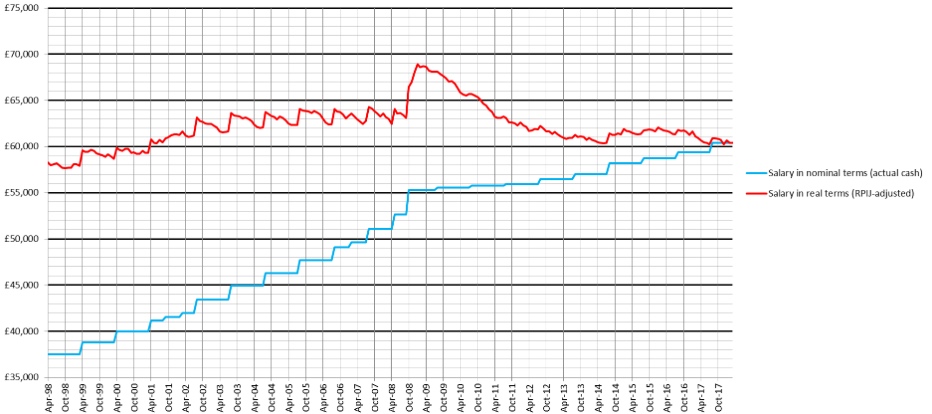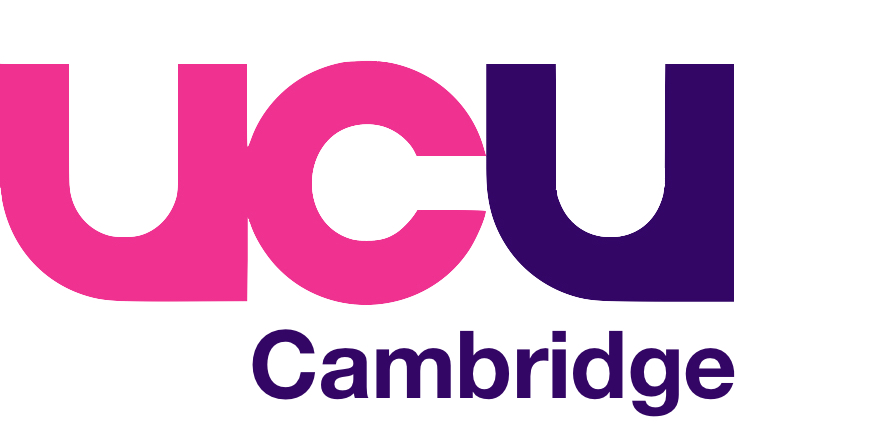This post is based on the first in a series of emails sent by Cambridge UCU to members on the consultative pay ballot that closes at noon on Wednesday June 27. Cambridge UCU strongly recommends that all members vote to reject the pay offer and in favour of industrial action.
—
The university employers’ final pay offer to staff this year is a 2% increase on the pay spine – yet another real terms pay cut. This comes after a decade of pay decline; when pay settlements are cumulatively compared to rises in RPI, staff have lost around 21% in the value of their pay since 2010. Meanwhile our workplaces are host to mammoth gender pay gaps, spreading casualisation and chronic overwork. This is a choice on the part of the employers, not a necessity: vice-chancellors need to think again.
Staff pay: steep decline since 2009
Real terms pay for university staff has declined precipitously since 2009, regardless of which measure of inflation you use. Take a look at the graph below, which shows the decline for someone at spine point 51.

Source: Mike Otsuka
The table below shows how much someone on the average sector pay (roughly equivalent to a lecturer’s starting salary) would be paid today had their salary kept pace with inflation (measured by four different indices) since January 2009.
| Index used: | RPI | RPIJ | CPI | CPIH |
| Jan’ 09 pay in 2018 Prices | £50,124 | £47,190 | £46,742 | £45,868 |
| 2018 pay | £41,212 | £41,212 | £41,212 | £41,212 |
| % drop | 17.8% | 12.7% | 11.8% | 10.2% |
There are disagreements over which measure of inflation best reflects changes in the real cost of living. It is easy to see why the employers use CPIH (CPI plus owner-occupier housing costs), which many think routinely underestimates the true cost of increases in household expenses. But even by this measure, average pay has diminished by more than 10% in real terms since 2009. Someone in the middle of the pay distribution would today be paid £4,500 more per year had their pay kept pace with CPIH. If their pay had kept pace with RPI (which UUK regarded as a reasonable measure when discussing tuition fees last year) then her salary would be a staggering £9,000 higher than its present £41,000.
Lagging behind the rest of economy
While wage growth across the UK economy has been poor since 2009, the deterioration of pay in HE has been considerably worse than the national average. Since 2014 real wages elsewhere in the economy have recovered to their 2009 levels, while HE pay has stagnated. Today HE pay remains more than 10% below 2009 levels (by CPIH). The trend over the last year has been for the level of pay settlements in the rest of the economy to rise. This is expected to continue. So even leaving aside the steady decline of of HE salaries since 2008, the employers’ offer this year is unusually mean in comparison to the rest of the economy.
Can universities pay more?
Yes. The idea that universities cannot afford to remunerate staff is risible. As the table below shows, staff costs as a percentage of total income across HE have decreased every year but one since 2009, from 56.6% in 09/10 to 52.9% in 16/17: a 6.5% decrease in the proportion of the sector’s income being invested in its staff. Meanwhile, total capital expenditure in Higher Education has increased by nearly 35% in the same period, to nearly £5bn per year, while annual surpluses have increased steadily from £0.82bn in 09/10 to £2.27bn in 16/17. The sector’s cash reserves have consequently ballooned, from £12bn in 09/10 to £44bn in 16/17: an increase of more than 250%.
Meanwhile, total capital expenditure in Higher Education has increased by nearly 35% in the same period, to nearly £5bn per year, while annual surpluses have increased steadily from £0.82bn in 09/10 to £2.27bn in 16/17. The sector’s cash reserves have consequently ballooned, from £12bn in 09/10 to £44bn in 16/17: an increase of more than 250%.
The steady erosion of university staff pay in the last decade has been a choice, not necessity, as might be obvious from soaring remuneration for senior managers. Now, months after docking millions of pounds of pay from staff defending the right to a decent pension, the employers offer another real terms pay cut. It is time that they were made to reassess their priorities.
A recent survey shows that students overwhelmingly want universities to prioritise investment in staff over the construction of shiny buildings. We need to stop a rot that has seen us receive below-CPI pay ‘rises’ almost without exception, for almost a decade, and made UK Higher Education an increasingly unattractive to place to work in. Vote to reject the pay offer and for action, and if you are not a member of UCU, join now!
